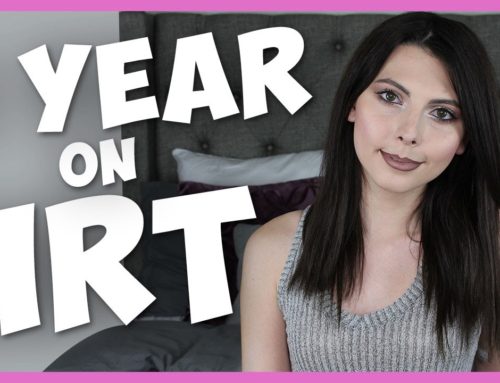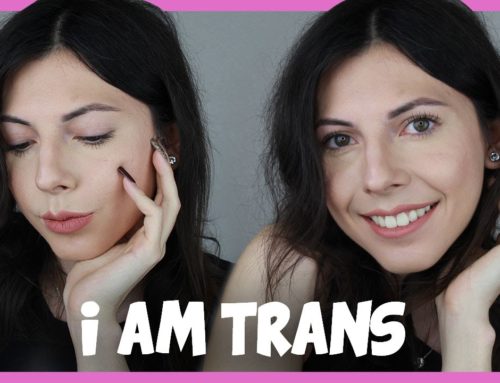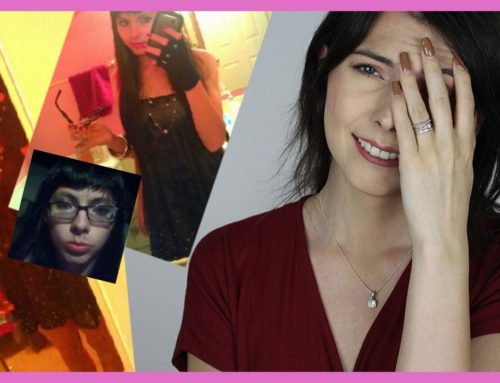Suddenly Samantha Talks: Coming Out & Transitioning in Your 30’s With Kids
I am Samantha, I’m 35 years old and I identify as a lesbian, transgender woman and my pronouns are she/her.
Q: Were there any signs or feelings in your childhood that you were Transgender?
I can remember when I was 7 years old going to bed wishing that I would wake up as a girl. That is my earliest memory. Looking back there were other signs even before that. Growing up with my sister, I would connect with her more times than I ever did as a boy. From the time I was nine or ten I had this underlying feeling that this was what I was dealing with.
Q: Did you ever struggle with your gender?
I was afraid. I was afraid to address it or to bring it up with anyone else. I didn’t talk to anyone about it. I just had a feeling that it would be something that would be seen as wrong or that I shouldn’t be feeling. I was still really afraid to express who I was or feeling any of it at all.
Q: When did you learn what being Transgender was?
In the 90’s was the first I heard about it, from Ace Ventura with Jim Carey – and he was portrayed in the media as a villain. It didn’t get much better as I grew up, the only other times I saw transgenders were in talk shows like Jerry Springer or nightline, and again, they were cast as people deceiving other people and troublemakers. This was not me and I knew it was not what I wanted. I didn’t want to be some highlight on a talk show, so it scared me deeper into the closet.
Q: Tell me about the first time you crossdressed.
I did not cross dress a lot in my process. I was terrified that someone would find out and I really avoided it for a very long time. It wasn’t until just a few months before I finally came out and had started hormones that I tried makeup. It was scary to even put on basic foundation, lipstick, and eyeliner. It was rough – the first time you try it, it’s scary. It took a while to discover what my style was.
Q: How did therapy affect your transition?
The thing about therapy is, I was dealing with this dysphoria for the better part of a decade and I tried therapy several times, but I wasn’t at a point in my own understanding of myself where I was comfortable talking about these feelings that I had been having. So I kind of went into therapy hoping that the therapist would guess that I was dealing with gender dysphoria. That is not how therapy really works, you need to actually open up and provide information that allows a therapist to help you with your issues. I finally did go to a therapist after I had the initial conversation of coming out. In the therapy session, it was an unboxing of these emotions that I had hidden for a long time.
It didn’t take much longer for my therapist to confirm, yeah, this is you, this is the real you that you boxed away. It felt really good to have that better understanding of myself. I think that therapy sessions were very valuable early in transition. I was going basically every week for that first year of my transition. I then went every other week. There is so much that happens in this process and so much that changes. Getting through those emotional early days, I really benefited from having a great therapist that knew gender issues. If you are in a similar situation, I suggest you find a therapist that knows.
Q: Tell me about coming out as Transgender? Who did you tell first and what was their response?
Coming out as an adult – I started transitioning on my own. I wasn’t really sure how to pull my parents into the conversation. We sat down and set up a calendar and kind of laid out to tell them around 3 or 4 months after starting HRT. In the meantime, I was still preparing and going through my early transition. I had actually already started to research my surgeries and even had the surgery paperwork printed out.
What happened with my mom was she was over watching the kids one day and they had accidentally knocked over some of the paperwork. On there, it had my new name, it listed exactly what surgery I was going to get, etc. That was how my mom found out about all of this. Which is terrible. What is worse is that she waited a week until I mentioned it for us to talk about it. Sorry, Mom. After we talked to her that first time, I was lucky that she was open. She struggled with it, I think what was really hard for my mom was that I’d been in pain for so long growing up with this and harboring this. Being the great mom that she is, she wanted to be there for me and comfort me, but it wasn’t her fault. There was nothing she could really do about it, as I did not tell her about it. She was a great mom in all other aspects. It took a while for her to forgive herself for it. I try to remind her often that she’s pretty awesome.
My dad was a little bit easier. My parents are divorced. I went over to his house and we were just sitting in his backyard, this is about a month after my mom found out about it, I just ended up walking him through it. At the time, my relationship with my dad wasn’t fantastic, but since starting my transition we have gotten a lot closer. He has been one of my greatest supporters. He actually traveled with me to South Korea for my surgeries just 2 months after I came out to him. It was a great experience, I had a good time with him and it helped us really reconnect.
I think I was pretty lucky with friends and family overall. It is interesting when you first come out to somebody, especially with how visible the transgender movement has been recently, people know that they need to be supportive. There had been a lot of instant support, “oh yeah we support you, we support you,” but then they don’t realize that this is more than just this instant and it is something that will go on from here. There is a little bit of a learning curve, there is a transition phase in there. I came out to one of my best friends from elementary school and we’re still great friends. I was supposed to be in his wedding as a groomsman and I wanted to let him know what was going on. I invited him over for lunch one day and told him. I asked him, “well, what do you think about all this, and what is your take on this.” He said, “well, I’m just so glad you didn’t want to pull out of the wedding.” I said, “do you still want me in your wedding?” He said, “of course I want you in the wedding. You are one of my good friends and I would love to have you there.” I ended up being in the wedding as a groom’s person, it was really nice.
Most of my friends have been the same. I’d say that some of my older friendships maybe are a little more distant than they were before. That’s probably more a function of how much busier I am with the new relationships I’ve made since coming out.
Q: Was there any point in time you remember talking about your gender? Or someone being overly questioning of what you were doing?
As for family, it has been a mixed bag. Overall, my immediate and close family has been very supportive. This support has been great. There’s definitely a learning curve in there and my parents took a couple of months to get the pronouns and name right all the time. I think with those close family members we have to allow for some of that. They were trying and they have gotten it down. Some of the more distant family members had a hard time with it. In those situations, I’ve just tried to remove myself from those conversations, as much as possible. Being in my mid-30s I have the opportunity where if I don’t agree with somebody in the family, I can choose to not put up with it. I know it is not a reflection of me, it is a reflection of them. I try not to let it bother me.
For my kids, we really debated on how to come out to them, and what we ended up doing was writing a short story for each of them. I have 4 kids altogether, all boys. Their ages were 6, 4, 2, and 4 months old at the time that I came out. For the older ones, we wrote a short story for them. The letters laid it out in their understanding level and explained that I’d be going through this change and I would start presenting and wearing more feminine clothing and makeup, but the most important thing about the story is that no matter how I look on the outside I would still be there for them and continue to play video games and Legos and everything else we’ve always done. I was just being a little different on the outside.
One thing that was a little difficult to work through was what the kids were going to call me. I really struggled with the old name. I didn’t think that I could use the old name I had, what would the kids call me in public, like daddy in public – what would that do? At the same time though, she carried these kids for 9 months, gave birth to them, she was definitely “mom.” I did not want to be some made-up name. I wanted to be a parent in full to our kids. Over some time as we talked through it and walked through it, we came to an understanding of it. This wasn’t me trying to take her role or anything like that, but I’m a mom too. We finally decided that she would keep the name mom and I would be mama to our boys. My oldest son was one of my earliest supporters. We told him and within a week and a half he was right on the name and on the pronouns and has not messed up once since then. He is my biggest supporter and if anyone does use my old name, he is on them. All kids want is loving parents. Kids just need that, that is what they thrive on. If anything, I have been able to be a better parent through this process, because I don’t have to be burdened with that depression and sadness I had to carry so long. I am way more engaged as a parent. I am more emotionally connected than I was before and for me, for the first time, I really feel like the parent I was always meant to be.
Q: What was your first step into transitioning?
My first step in transition was meeting with a therapist. It’s the whole reason I was able to start up this process because to move forward with hormones, you need a recommendation letter that you can take to a doctor. I was able to get that letter and found an endocrinologist that would work with me. Then I started hormones a month and a half after I came out. I moved pretty quickly through my transition because I think I had sat on it long enough. I knew it was the right way to move forward. I didn’t want to waste any time. I actually had my first transition-related surgery at the same time that I started hormones. There are not a lot of benefits to starting transition later in life, but some of the good things are there are a lot fewer roadblocks.
Q: Have there been any milestones or goals you’ve accomplished since starting transitioning that you’re proud of?
My transition has been made up of so many milestones. When I started the transition I had a piece of paper and sat down to list out everything that I wanted to do in this process. Some little yet really neat milestones were the first time I went out shopping for clothing and the first time I presented as myself in public, those are both important. It truly is a journey of a thousand steps.
Originally when I came out, I knew I would not be able to stay in the closet for much longer. I had already been hiding this for so long. It wasn’t too long after I started on hormones that I really started to shift my clothing and wardrobe over to the more feminine presentation. I wasn’t out at work yet. I was having to switch back and forth, back and forth. Every morning I would dress for work and be crying over it because I had to put on a guys polo shirt and guys pants. It was very much not okay. When the day was over, I came home and I was basically stripping down to put on clothes I was comfortable in. I slowly started to switch over to wearing a wardrobe more in the middle with flannels, skinny jeans, and I bought androgenous shoes to wear to work and I slowly started my transition towards full-time. It was interesting that one day I woke up for work and I realized I had switched my flannels, I was wearing girl jeans, I was wearing Chuck Taylors and I’m not wearing any guy clothes at all. This was one of my first authentic moments I felt when I basically went full time without ever saying that I was going full-time.
Q: What kind of struggles have you faced in public?
When you first start presenting in public, there is this really awkward phase in your transition where you are still trying to figure out your looks and your style, and your kind of waiting for hormones to do their thing… I think this is really tough because you’re physically transitioning and all eyes are on you. That was tough to let roll off my back, especially with family and for the kids. People are giving you a stink eye or this person is trying to figure you out. The public was really tough early in transition, but I will say that over time you just start caring a lot less. If someone is staring at you, it’s okay, it’s kind of funny that you know there’s nothing else going on in their lives more interesting than staring at a stranger. As long as I am good with who I am, I’m not worried about it.
Q: At what step do you feel you were truly being yourself?
At this point, I’d pretty much consider my transition complete. There are still things that I am working on internally. Things like self-love and acceptance, but I do not have any more surgeries planned or anything like that.
Q: What’s next for you?
Going forward in my own life, I have really enjoyed the advocacy work I have done in my community and here in town, I’m on the board for an organization that works with the transgender population. I’ve been really vocal online. I host a TV show on YouTube called Trans IRL that discusses trans issues with other people in the community and our allies which has been really great to get some of that educational material out there and show the world who we are. One of the greatest things we can do is be ourselves, be visible, and I’m really excited to be a part of that.
Q: What’s one message you would give to your younger self and children going through a similar situation?
If I could talk to my younger self, first off I would give them a hug. All the years of suffering through what I suffered through is sad to look back on. I waited so long before I finally felt like I could talk about any of this. I’d say, be patient, there is goodness coming your way.
For young people out there that are going through this, I think the greatest thing that has come from social media is to know you’re not alone! You’re not alone! If you’re reading this you’re definitely not alone! There are so many other people out there that support you and love you! There are those that will love you, through this process! Know that, although things may not be easy right this second, you will get through this and you’ll be okay.




